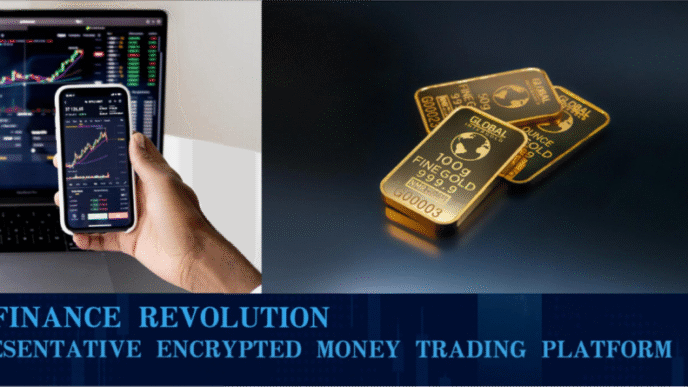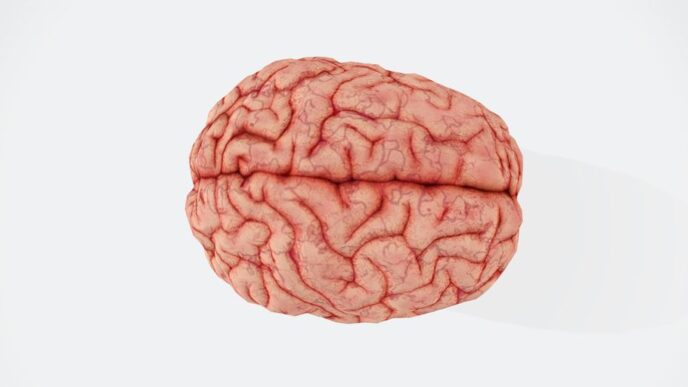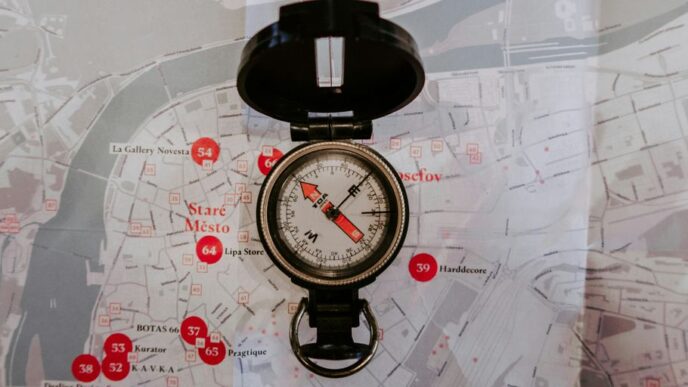So, you want to grow your business using social media? That’s a smart move. But it’s not just about posting random stuff and hoping for the best. You need a real plan, something you can follow, kind of like a blueprint. That’s where a solid social media strategy pdf comes in handy. It helps you figure out what you’re doing, who you’re talking to, and how you’ll know if it’s actually working.
Key Takeaways
- Figure out what you want your social media to do for your business.
- Know who you’re trying to reach with your posts.
- Make a plan for what you’ll post and when.
- Check your numbers often to see what’s working.
- Be ready to change things up as social media changes, because it always does.
Crafting Your Core Social Media Strategy PDF
Building a solid social media strategy is like laying the foundation for a house; if it’s not strong, the whole thing might just fall apart. It’s not about just posting random stuff; it’s about having a clear plan that helps your business grow. You need to think about what you want to achieve, who you’re trying to reach, and what everyone else in your space is doing. This initial work makes everything else you do on social media much more effective.
Defining Your Business Objectives for Social Media
Before you even think about what to post, you need to figure out why you’re on social media in the first place. What’s the big picture goal? Having clear objectives helps you measure if your efforts are actually working. Without them, you’re just throwing things at the wall to see what sticks, and that’s not a good use of time or money. Think about what success looks like for your business on these platforms.
Here are some common business objectives for social media:
- Increase Brand Awareness: Getting more people to know who you are and what you do.
- Drive Website Traffic: Getting social media users to visit your website, where they can learn more or make a purchase.
- Generate Leads: Collecting contact information from potential customers.
- Improve Customer Service: Using social media as a channel to help and support your existing customers.
- Boost Sales/Conversions: Directly selling products or services through social media or driving purchases on your site.
- Build Community: Creating a loyal following and fostering engagement among your audience.
Each objective will guide the type of content you create and the platforms you choose. For example, if your goal is brand awareness, you might focus on highly shareable content and broad reach. If it’s sales, you’ll likely use more direct calls to action.
Identifying Your Target Audience on Social Platforms
Knowing who you’re talking to is super important. You wouldn’t talk to a teenager the same way you’d talk to a CEO, right? The same goes for your social media audience. If you don’t know who they are, what they like, or where they hang out online, your messages will just get lost in the noise. This step is about creating a detailed picture of your ideal customer.
Consider these points when defining your target audience:
- Demographics: Age, gender, location, income, education level.
- Interests: What hobbies do they have? What topics do they care about?
- Pain Points: What problems are they trying to solve? How can your business help?
- Online Behavior: Which social media platforms do they use most? When are they online? What kind of content do they engage with?
- Goals: What are they trying to achieve in their personal or professional lives?
Creating audience personas can be really helpful here. Give them names, backstories, and specific characteristics. This makes it easier to imagine you’re talking to a real person when you’re crafting your posts. Understanding your audience is a key part of social media marketing success.
Analyzing Competitor Social Media Strategies
It’s always a good idea to see what your competitors are up to. Not to copy them exactly, but to learn from what they’re doing well and, more importantly, what they’re not doing well. This can give you ideas for what works in your industry and help you find gaps you can fill. Think of it as market research, but specifically for social media.
Here’s what to look for when analyzing competitors:
- Platforms Used: Which social media channels are they active on?
- Content Types: What kind of content do they post (videos, images, articles, polls)?
- Posting Frequency: How often do they post on each platform?
- Engagement Levels: How many likes, comments, and shares do their posts get? Are people interacting with them?
- Audience Response: What are people saying in the comments? Are there common questions or complaints?
- Strengths: What are they doing really well? What seems to be working for them?
- Weaknesses/Gaps: Where are they falling short? Are there opportunities for you to do something different or better?
By looking at what others in your space are doing, you can get a clearer idea of what’s expected and how you can stand out. It’s about finding your unique voice and approach within the competitive landscape.
Developing Engaging Content for Your Social Media Strategy PDF
Creating a Diverse Content Calendar
Making a good content calendar is about more than just filling up slots; it’s about planning out what you’re going to say and when, so it actually makes sense to your audience. You want a mix of things: some posts that teach, some that make people laugh, some that show off your products or services, and some that just give a peek behind the scenes. A well-thought-out content calendar helps you stay organized and makes sure you’re always putting out fresh, interesting stuff. Think about the different types of content you can create:
- Educational posts: These could be quick tips, how-to guides, or explanations of complex topics related to your business.
- Entertaining content: Memes, short videos, or fun polls can grab attention and make your brand more likable.
- Promotional content: This is where you talk about your products, services, or special offers. Don’t overdo it, though.
- Behind-the-scenes glimpses: Show off your team, your office, or how your products are made. This builds trust and connection.
Optimizing Content for Each Social Platform
Every social media platform has its own vibe, its own rules, and its own audience. What works great on Instagram might fall flat on LinkedIn, and vice-versa. You can’t just copy and paste the same message everywhere. You need to tweak your content for each one. For example, Instagram is all about strong visuals, so your photos and short videos need to be top-notch. LinkedIn is more professional, so longer articles or industry insights do better there. TikTok is for quick, engaging videos. Facebook is still good for community building and longer-form text posts. Understanding these differences is key to getting your message across effectively. For example, consider these platform-specific approaches:
| Platform | Content Focus | Best Practices |
|---|---|---|
| Visuals, Stories | High-quality photos, short videos, engaging captions, relevant hashtags | |
| Professional, Informative | Industry news, thought leadership articles, company updates, networking | |
| TikTok | Short-form Video | Trending sounds, creative challenges, quick tutorials, authentic humor |
| Community, Engagement | Group discussions, live videos, event promotion, customer service |
Leveraging Visuals and Multimedia in Your Strategy
People are drawn to visuals. It’s just how our brains work. A good image or video can stop someone from scrolling right past your post. This means you need to put effort into making your visuals look good. This isn’t just about pretty pictures; it’s about using graphics, videos, and even audio to tell your story. Think about using:
- High-quality photos: These are a must. Blurry or poorly lit pictures just won’t cut it.
- Short, engaging videos: These can be tutorials, product demos, or just fun clips. They often get more attention than static images.
- Infographics: If you have data or complex information, an infographic can make it easy to understand.
- GIFs and memes: These can add personality and humor to your posts, making them more shareable.
Remember, the goal is to make your content stand out and grab attention. Using a mix of these elements can really make a difference in how your audience responds. For more ideas on how to grow your business, check out these social media marketing tips for small businesses.
Implementing Your Social Media Strategy PDF Across Platforms
Once you’ve got your social media strategy all planned out, the next big step is actually putting it into action. It’s like having a great recipe; you still need to cook the meal. This part is all about getting your content out there and making sure it reaches the right people on the right platforms.
Choosing the Right Social Media Channels
Picking the right places to hang out online is super important. You don’t need to be everywhere; you just need to be where your audience is. Think about where they spend their time and what kind of content they like to see there. For example, if you’re selling visual products, Instagram or Pinterest might be your go-to. If you’re in B2B, LinkedIn is probably a better bet. It’s about quality over quantity when it comes to platform presence.
Here’s a quick way to think about it:
- Audience Demographics: Who are you trying to reach? Different platforms attract different age groups and interests.
- Content Type: What kind of content do you plan to create? Some platforms are better for video, others for text or images.
- Business Goals: What do you want to achieve? Lead generation, brand awareness, customer service – each platform has its strengths.
Scheduling and Publishing Content Effectively
Getting your content out there consistently is key. You can’t just post whenever you feel like it. That’s where scheduling tools come in handy. They let you plan out your posts in advance, so you can set it and forget it (mostly). This helps you maintain a steady flow of content without having to be glued to your screen all day. Plus, you can optimize for peak engagement times.
Consider these points for effective scheduling:
- Consistency: Regular posting keeps your audience engaged and your brand top-of-mind.
- Optimal Times: Research when your audience is most active on each platform and schedule accordingly.
- Variety: Mix up your content types – don’t just post the same thing over and over.
Engaging with Your Audience Consistently
Social media isn’t a one-way street. You can’t just broadcast your message and expect results. You have to talk to people! Respond to comments, answer questions, and participate in conversations. This builds a community around your brand and shows people you care. It’s how you turn followers into loyal customers. For businesses looking to grow, consistent engagement is a big part of a digital marketing strategy.
Ways to engage with your audience:
- Respond Promptly: Don’t leave comments or messages hanging. Quick replies show you’re attentive.
- Ask Questions: Encourage interaction by posing questions in your posts.
- Run Polls/Quizzes: These are fun ways to get people involved and gather feedback.
- Go Live: Live videos allow for real-time interaction and a more personal connection.
Measuring Success with Your Social Media Strategy PDF
So, you’ve put in all this work, right? You’ve planned, you’ve posted, you’ve engaged. Now comes the part where you figure out if any of it actually worked. It’s not enough to just throw stuff out there and hope for the best. You gotta know what’s hitting and what’s missing the mark. This is where measuring success comes in, and it’s probably the most important step if you want to keep growing.
Tracking Key Performance Indicators (KPIs)
Alright, let’s talk KPIs. These aren’t just fancy buzzwords; they’re the actual numbers that tell you if your social media efforts are paying off. Forget about just counting likes or followers – those are what we call "vanity metrics." They look nice, but they don’t really tell you much about your business’s bottom line. What you really need to focus on are metrics that tie directly back to your business goals. For example, if your goal is to drive sales, you’d look at conversion rates from social media. If it’s brand awareness, you’d track reach and impressions. It’s all about aligning your metrics with what you’re trying to achieve.
Here are some common KPIs you should be keeping an eye on:
- Engagement Rate: This tells you how many people are actually interacting with your content (likes, comments, shares, clicks) compared to how many saw it. A high engagement rate means your content is resonating.
- Click-Through Rate (CTR): If you’re sharing links, this is super important. It shows you how many people clicked on your link after seeing your post. A good CTR means your call to action is effective.
- Conversion Rate: This is the big one for many businesses. It measures how many social media users completed a desired action, like making a purchase or filling out a form, after clicking through from your social channels. This is where you start to see your social media ROI.
- Reach and Impressions: Reach is the number of unique users who saw your content, while impressions are the total number of times your content was displayed. These give you a sense of your content’s visibility.
- Audience Growth Rate: While not a vanity metric on its own, consistent, organic growth in your follower count can indicate that your content is attracting new, relevant people.
Utilizing Social Media Analytics Tools
So, how do you get all this data? You don’t have to manually count every like or click, thankfully. There are tons of social media analytics tools out there that do the heavy lifting for you. Most social media platforms themselves have built-in analytics dashboards (think Facebook Insights, Instagram Insights, Twitter Analytics). These are a great starting point, giving you basic data on your posts, audience demographics, and engagement.
But if you’re serious about understanding your performance, you’ll probably want to look into third-party tools. These often offer more in-depth analysis, cross-platform reporting, and competitive benchmarking. Some popular ones include Hootsuite, Sprout Social, and Buffer. They can help you:
- Track performance across all your social channels in one place.
- Generate custom reports to share with your team or stakeholders.
- Identify your top-performing content and what times are best to post.
- Monitor mentions of your brand and track sentiment.
- Analyze competitor performance to see what they’re doing right (or wrong).
Choosing the right tool depends on your budget and your specific needs, but the key is to use something to gather your data systematically.
Interpreting Data for Strategic Adjustments
Okay, you’ve got all this data. Now what? Just looking at numbers won’t do you any good if you don’t know what they mean or how to act on them. This is where interpretation comes in. It’s like being a detective: you’re looking for patterns, anomalies, and insights that can help you make better decisions.
For example, if you see that your engagement rate on Instagram is consistently higher than on Facebook, it might mean your audience on Instagram is more active, or your content style there is more effective. If a certain type of post (like video) gets way more clicks than others, you should probably make more videos. On the flip side, if a campaign you thought was brilliant totally flopped, the data will show you that, and you can figure out why.
Here’s how to approach interpreting your data:
- Look for Trends: Are your KPIs generally going up or down over time? Are there specific days or times when your content performs better?
- Compare Against Goals: Did you hit your targets? If not, by how much did you miss them? This helps you understand the gap between your current performance and your desired outcome.
- Identify Top and Bottom Performers: Which posts, campaigns, or content types did exceptionally well? Which ones fell flat? Learn from both successes and failures.
- Segment Your Data: Look at performance by platform, by audience segment, or by content type. This can reveal hidden insights.
- Ask "Why?": Don’t just note the numbers; try to understand the reasons behind them. Did a particular event influence your reach? Was a certain call to action more compelling?
Once you’ve interpreted the data, you can make informed strategic adjustments. Maybe you need to tweak your content strategy, reallocate your budget, or even reconsider which platforms you’re focusing on. It’s an ongoing cycle of measuring, learning, and refining. That’s how you keep your social media strategy sharp and ensure it keeps contributing to your business’s growth.
Refining Your Social Media Strategy PDF for Growth

Social media isn’t a set-it-and-forget-it kind of thing. It’s always changing, and what worked yesterday might not work today. So, you gotta keep an eye on your strategy and be ready to tweak it. Think of your social media plan as a living document, something you come back to and update regularly. It’s all about staying flexible and making sure your efforts are still hitting the mark.
Adapting to Evolving Social Media Trends
Social media platforms are like fashion trends – they come and go, and they’re always changing. New features pop up, algorithms shift, and what users want to see can be totally different from one month to the next. Staying on top of these changes is super important if you want your content to actually be seen and make an impact. You can’t just stick to the same old routine forever. Here’s how to keep up:
- Follow industry news: Read blogs, subscribe to newsletters, and listen to podcasts from social media experts. They often give you a heads-up on what’s coming.
- Watch what the platforms are doing: Pay attention to announcements from Facebook, Instagram, TikTok, and others. They’ll tell you about new tools or changes to how content is shown.
- Look at what competitors are doing: See if they’re trying out new formats or platforms. You don’t have to copy them, but it can give you ideas.
- Experiment with new features: When a platform rolls out something new, give it a try. Sometimes being an early adopter can give you a big boost.
Incorporating User Feedback into Your Strategy
Your audience is basically telling you what they want, if you just listen. User feedback is gold because it tells you directly what’s working, what’s not, and what people wish you’d do differently. It’s not just about likes and comments; it’s about understanding the conversations happening around your brand. Here’s how to get that feedback and use it:
- Monitor comments and messages: Read everything. People often leave clues about what they like or dislike in their comments or direct messages.
- Run polls and surveys: Ask your audience directly what kind of content they want to see more of, or what topics they’re interested in. Simple polls on Instagram Stories or Twitter can be really effective.
- Look at reviews and mentions: See what people are saying about your brand outside of your own posts. Are there common themes in positive or negative feedback?
- Engage in conversations: Don’t just post and leave. Respond to comments, ask questions, and show that you’re listening. This encourages more feedback.
Conducting Regular Social Media Audits
Think of a social media audit as a check-up for your online presence. It’s where you take a good, hard look at everything you’re doing on social media to see if it’s still working for you. This isn’t a one-time thing; you should do it regularly, maybe every quarter or twice a year. It helps you spot what’s performing well and what needs to be changed. A good audit helps you refine your social media marketing strategy and make sure you’re not wasting time or resources. Here’s what to look at during an audit:
- Content performance: Which posts got the most engagement? Which ones fell flat? Look at likes, shares, comments, and clicks.
- Audience growth and demographics: Are you reaching the right people? Is your audience growing at a healthy rate?
- Platform effectiveness: Are certain platforms giving you better results than others? Maybe you’re spending too much time on a platform that isn’t delivering.
- Competitor analysis: What are your competitors doing well? What could you learn from them?
- Goal alignment: Are your social media activities still helping you meet your overall business goals? If not, it’s time to adjust.
Advanced Tactics for Your Social Media Strategy PDF
Exploring Paid Social Media Advertising
So, you’ve got your organic social media game down, right? That’s awesome. But if you’re looking to really step things up and get your message in front of a lot more eyeballs, paid social media advertising is where it’s at. Think of it like this: organic reach is great for your existing followers, but ads let you find new ones, people who might not even know your business exists yet. It’s a powerful way to expand your audience and drive specific actions, like website visits or purchases.
When you’re setting up these ads, you’ve got a bunch of options. You can target people based on their interests, their demographics (like age or location), or even what they’ve done on your website before. It’s pretty precise, which means your ad budget goes further. Here are some common ad types you might use:
- Image Ads: Simple, eye-catching, and great for brand awareness.
- Video Ads: Super engaging, perfect for telling a story or showing off a product in action.
- Carousel Ads: Let you showcase multiple products or features in one ad, which is neat.
- Lead Generation Ads: Designed to collect contact info directly within the social platform, making it easy for potential customers.
And don’t forget about A/B testing! That’s where you run two slightly different versions of an ad to see which one performs better. It helps you figure out what really clicks with your audience.
Building Influencer Marketing Partnerships
Influencer marketing is basically getting people who already have a big, engaged following to talk about your business. It’s like word-of-mouth marketing, but on a much bigger scale. People tend to trust recommendations from individuals they follow more than traditional ads, so this can be a really effective way to build credibility and reach new audiences. Growing your business often means finding new ways to connect with potential customers.
When you’re looking for influencers, it’s not just about follower count. You want someone whose audience aligns with your target market. A micro-influencer (someone with a smaller but very dedicated following) can sometimes be more effective than a mega-influencer if their audience is a perfect fit for your product or service. Here’s what to consider:
- Relevance: Does their content and audience match your brand?
- Engagement Rate: Do their followers actually interact with their posts, or are they just passive observers?
- Authenticity: Do they genuinely seem to like and use products similar to yours?
- Brand Fit: Will their personal brand and values align with yours?
Once you find the right partners, you can work together on sponsored posts, product reviews, giveaways, or even takeovers of your social media accounts. Just make sure everything is transparent and follows advertising guidelines.
Fostering Community Engagement and Loyalty
Social media isn’t just for broadcasting your message; it’s also a place to build a real community around your brand. When people feel like they’re part of something, they’re more likely to stick around, become loyal customers, and even advocate for your business. It’s about creating a two-way conversation, not just pushing out content.
Think about ways to get your audience talking to each other and to you. This could involve:
- Asking questions: Simple questions in your posts can spark conversations.
- Running polls and quizzes: These are quick and easy ways for people to participate.
- Responding to comments and messages: Show people you’re listening and that you care about their input.
- Creating user-generated content campaigns: Encourage your followers to share their own content related to your brand, using a specific hashtag.
- Hosting live Q&A sessions: This lets you interact with your audience in real-time and answer their questions directly.
Building loyalty takes time and consistent effort. It’s about making your audience feel valued and heard. When you do that, they become your biggest fans and advocates, which is pretty much the best kind of marketing you can get.
Conclusion
So, there you have it. Putting together a good social media plan might seem like a lot of work at first. But honestly, it’s super important for getting your business noticed and growing. It’s not just about posting stuff whenever; it’s about having a real plan that helps you connect with people and get results. If you stick with it, keep learning, and change things up when you need to, you’ll see your business really take off online. It’s all about being smart with how you use these platforms.
Frequently Asked Questions
What is a social media strategy and why is it important for my business?
A social media strategy is like a roadmap for your business to use social media. It helps you figure out what you want to achieve, who you want to talk to, and what kind of stuff you’ll share online. It’s super important because it makes sure your efforts on social media actually help your business grow and reach its goals.
How do I create an effective social media strategy?
To make a good social media strategy, you need to know what your business wants to do (like get more customers or build your brand). Then, figure out who your perfect customers are and what social media sites they use. Look at what your competitors are doing, too. This helps you pick the right platforms and create content that your audience will love.
Which social media channels should I focus on for my business?
You should pick social media channels where your target audience hangs out the most. For example, if you sell handmade jewelry, Instagram and Pinterest might be great. If you offer business services, LinkedIn could be better. It’s about going where your future customers are already spending their time.
What kind of content should I create to engage my audience?
To keep your audience interested, share a mix of posts like helpful tips, fun stories, behind-the-scenes looks, and questions to get them talking. Use nice pictures and videos. Make sure your posts fit the style of each social media site. Don’t just sell; try to teach, entertain, and connect with people.
How can I measure the success of my social media strategy?
You can tell if your social media strategy is working by looking at things like how many people see your posts, how many click on your links, how many new followers you get, and how much people interact with your content (likes, comments, shares). Most social media sites have tools to help you track these numbers.
How often should I update or change my social media strategy?
Social media is always changing, so your strategy should too! Keep an eye on new trends and updates on different platforms. Listen to what your audience says and how they react to your posts. Every now and then, take a good look at your whole strategy to see what’s working and what needs to be made better. This helps you stay ahead and keep growing.














